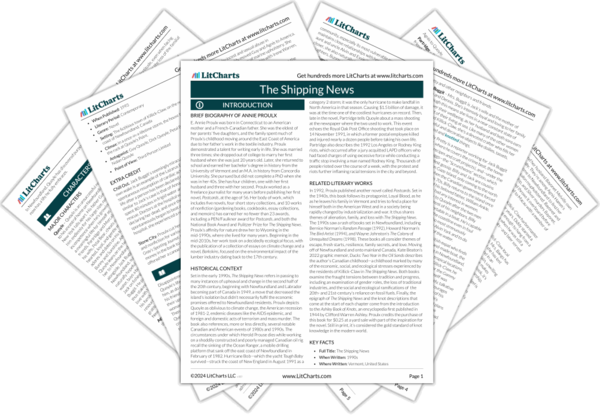Brief Biography of Annie Proulx
E. Annie Proulx was born in Connecticut to an American mother and a French-Canadian father. She was the eldest of her parents’ five daughters, and the family spent much of Proulx’s childhood moving around the East Coast of America due to her father’s work in the textile industry. Proulx demonstrated a talent for writing early in life. She was married three times; she dropped out of college to marry her first husband when she was just 20 years old. Later, she returned to school and earned her bachelor’s degree in history from the University of Vermont and an M.A. in history from Concordia University. She pursued but did not complete a PhD when she was in her 40s. She has four children, one with her first husband and three with her second. Proulx worked as a freelance journalist for many years before publishing her first novel, Postcards, at the age of 56. Her body of work, which includes five novels, four short story collections, and 10 works of nonfiction (gardening books, cookbooks, essay collections, and memoirs) has earned her no fewer than 23 awards, including a PEN/Faulkner award for Postcards, and both the National Book Award and Pulitzer Prize for The Shipping News. Proulx’s affinity for nature drew her to Wyoming in the mid-1990s, where she lived for many years. Beginning in the mid-2010s, her work took on a decidedly ecological focus, with the publication of a collection of essays on climate change and a novel, Barkskins, focused on the environmental impact of the lumber industry dating back to the 17th century.
Historical Context of The Shipping News
Set in the early 1990s, The Shipping News refers in passing to many instances of upheaval and change in the second half of the 20th century, beginning with Newfoundland and Labrador becoming part of Canada in 1949, a move that decreased the island’s isolation but didn’t necessarily fulfil the economic promises offered to Newfoundland residents. Proulx depicts Quoyle as oblivious to climate change, the American recession of 1981-2, endemic diseases like the AIDS epidemic, and foreign and domestic acts of terrorism and mass murder. The book also references, more or less directly, several notable Canadian and American events of 1980s and 1990s. The circumstances under which Herold Prouse dies while working on a shoddily constructed and poorly managed Canadian oil rig recall the sinking of the Ocean Ranger, a mobile drilling platform that sank off the east coast of Newfoundland in February of 1982. Hurricane Bob—which the yacht Tough Baby survived—struck the coast of New England in August 1991 as a category 2 storm; it was the only hurricane to make landfall in North America in that season. Causing $1.5 billion of damage, it was at the time one of the costliest hurricanes on record. Then, late in the novel, Partridge tells Quoyle about a mass shooting at the newspaper where the two used to work. This event echoes the Royal Oak Post Office shooting that took place on 14 November 1991, in which a former postal employee killed and injured nearly a dozen people before taking his own life. Partridge also describes the 1992 Los Angeles or Rodney King riots, which occurred after a jury acquitted LAPD officers who had faced charges of using excessive force while conducting a traffic stop involving a man named Rodney King. Thousands of people rioted over the course of a week, with the protest and riots further inflaming racial tensions in the city and beyond.
Other Books Related to The Shipping News
In 1992, Proulx published another novel called Postcards. Set in the 1940s, this book follows its protagonist, Loyal Blood, as he as he leaves his family in Vermont and tries to find a place for himself both in the American West and in a society being rapidly changed by industrialization and war. It thus shares themes of alienation, family, and loss with The Shipping News. The 1990s saw a rash of books set in Newfoundland, including Bernice Norman’s Random Passage (1992), Howard Norman’s The Bird Artist (1994), and Wayne Johnston’s The Colony of Unrequited Dreams (1998). These books all consider themes of escape, fresh starts, resilience, family secrets, and love. Moving off of Newfoundland and onto mainland Canada, Kate Beaton’s 2022 graphic memoir, Ducks: Two Year in the Oil Sands describes the author’s Canadian childhood—a childhood marked by many of the economic, social, and ecological stresses experienced by the residents of Killick-Claw in The Shipping News. Both books examine the fraught tensions between tradition and progress, including an examination of gender roles, the loss of traditional industries, and the social and ecological ramifications of the 20th- and 21st-century’s reliance on fossil fuels. Finally, the epigraph of The Shipping News and the knot descriptions that come at the start of each chapter come from the introduction to the Ashley Book of Knots, an encyclopedia first published in 1944 by Clifford Warren Ashley. Proulx credits the purchase of this book for $0.25 at a yard sale with part of the inspiration for the novel. Still in print, it’s considered the gold standard of knot knowledge in the modern world.
Key Facts about The Shipping News
-
Full Title: The Shipping News
-
When Written: 1990s
-
Where Written: Vermont, United States
-
When Published: 1993
-
Literary Period: Contemporary
-
Genre: Novel
-
Setting: The fictitious town of Killick-Claw, on the northern coast of Newfoundland, Canada
-
Climax: In a once-in-a-lifetime storm, the house blows off the rock at Quoyle’s Point.
-
Antagonist: Guy Quoyle, Dick Quoyle, Petal Bear, Tert Card, Nolan Quoyle
-
Point of View: Third Person Limited
Extra Credit for The Shipping News








